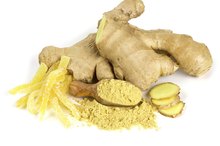Herbal Remedies for Nasal Polyps
Nasal polyps are small benign growths in your sinus cavities. They may develop if you’ve had chronically inflamed sinuses due to asthma, allergies, recurring infection or sinusitis. If they grow large enough, they may cause breathing difficulties and infections. Symptoms of nasal polyps can include postnasal drip, headaches, stuffy nose, itchy eyes and snoring. Herbs may help relieve nasal polyps naturally. Consult your health care provider before starting herbal treatment.
Herbal Actions
Herbs for nasal polyps work in different ways. Anti-inflammatory herbs will reduce the inflammation in your nasal passages and sinuses. Antimicrobial herbs can help fight any persistent infection that may be causing your polyps. Check with a qualified practitioner for advice about dosage and preparation of herbal remedies for nasal polyps.
- Herbs for nasal polyps work in different ways.
- Anti-inflammatory herbs will reduce the inflammation in your nasal passages and sinuses.
Xanthium
What Herbs to Use for Blocked Fallopian Tubes
Learn More
Xanthium, or Xanthium sibiricum, is an East Asian herb also known as “cang er zi” and “fructus xanthi” in traditional Chinese medicine, or TCM. Healers use the dried bur to treat rhinitis, sinusitis, nasal congestion and nasal polyps. In her “The Holistic Herbal Directory,” herbal consultant Penelope Ody recommends xanthium to clear wind and dampness -- the TCM explanation for nasal polyps -- and to open sinus passages 1. Xanthium is an ingredient in “Bi Yuan Wan,” a TCM formula for shrinking nasal polyps. Do not use this herb if you have diabetes or allergies to plants in the Aster family.
- Xanthium, or Xanthium sibiricum, is an East Asian herb also known as “cang er zi” and “fructus xanthi” in traditional Chinese medicine, or TCM.
- In her “The Holistic Herbal Directory,” herbal consultant Penelope Ody recommends xanthium to clear wind and dampness -- the TCM explanation for nasal polyps -- and to open sinus passages 1.
Goldenseal
Goldenseal, or Hydrastis canadensis, is a North American perennial with a long history of medicinal use. Herbalists use the rhizome and roots to stop bleeding and diarrhea. The herb is rich in isoquinoline alkaloids, which are potent antimicrobial and anti-inflammatory chemicals. Herbalist Christopher Hobbs recommends cool goldenseal tea used as a snuff, or inhalant, for nasal polyps because it will act on infected mucous membranes and reduce inflammation. Goldenseal may affect the uterus, so do not ingest it if you are pregnant.
- Goldenseal, or Hydrastis canadensis, is a North American perennial with a long history of medicinal use.
- Herbalist Christopher Hobbs recommends cool goldenseal tea used as a snuff, or inhalant, for nasal polyps because it will act on infected mucous membranes and reduce inflammation.
Cayenne
Are There Herbs That Dissolve Intestinal Mucus?
Learn More
Cayenne, or Capsicum annuum, is a red chili pepper found throughout North and South America. Herbalists use it to stimulate circulation and strengthen capillaries. The pepper is rich in a chemical called capsaicin, which has anti-pain and styptic actions. A study published in the March 2000 issue of “Acta Otolaryngologica” found that an application of capsaicin sprayed into the nasal passages shrunk polyps in patients with severe sinonasal polyposis, allowing them to breath more easily 3. Cayenne may cause irritation if not diluted enough.
- Cayenne, or Capsicum annuum, is a red chili pepper found throughout North and South America.
- The pepper is rich in a chemical called capsaicin, which has anti-pain and styptic actions.
Related Articles
References
- “The Holistic Herbal Directory”; Penelope Ody; 2009
- Christopher Hobbs' Herbal Prescriber Database: Information on Golden Seal
- “Acta Otolaryngologica”; Capsaicin Significantly Reduces Sinonasal Polyps; T. Baudoin, et al.; March 2000
- American Academy of Allergy, Asthma, and Immunology. Nasal Polyps.
- National Institutes of Health. MedlinePlus. Nasal Polyps. Updated August 12, 2019.
- Bachert C, Han JK, Desrosiers M, et al. Efficacy and safety of dupilumab in patients with severe chronic rhinosinusitis with nasal polyps (LIBERTY NP SINUS-24 and LIBERTY NP SINUS-52): results from two multicentre, randomised, double-blind, placebo-controlled, parallel-group phase 3 trials [published correction appears in Lancet. 2019 Nov 2;394(10209):1618]. Lancet. 2019;394(10209):1638‐1650. doi:10.1016/S0140-6736(19)31881-1
- Astrazeneca. Three clinical trials announced for Fasenra in eosinophil-driven skin diseases.
Writer Bio
Janet Contursi has been a writer and editor for more than 23 years. She has written for professional journals and newspapers, and has experience editing educational, cultural, and business articles and books. Her clients include Gale Publishers, Anaxos, Vielife and Twin Cities Wellness. Contursi earned her Ph.D. at the University of Minnesota, where she studied cultural anthropology, South Asian languages and culture, and art history.








